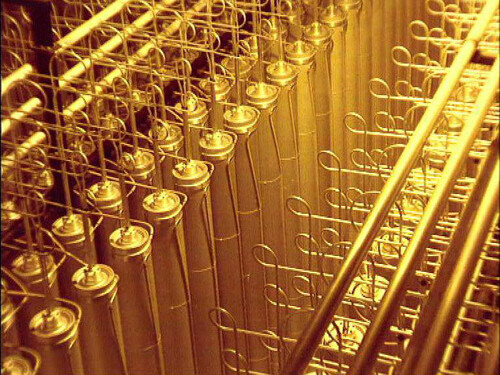hankyoreh
Links to other country sites 다른 나라 사이트 링크
Following centrifuge revelation, experts call for shift in N.Korea policy

By Son Won-je, Staff Writer
In response to North Korea’s display of nuclear capabilities with its revelation of hundreds of centrifuges, a number of experts issued strong calls Monday for a shift in the government’s North Korea policy, arguing that the foregone failure of the policy emphasis from Seoul and Washington was made apparent. “The Lee Myung-bak administration’s waiting strategy and the Obama administration’s ‘strategic patience’ worked together to create a policy failure,” said Inje University Unification Studies Professor Kim Yeon-chul. “North Korea had already demonstrated its continued strengthening of its nuclear capabilities with the past two nuclear tests, though negotiations have not taken place.”
Kim added, “North Korea’s strengthening nuclear capabilities was clearly anticipated, yet the South Korea and U.S. government abandoned negotiations for three years.”
Peace Network representative Cheong Wook-sik said, “Some have talked about how the sanctions on North Korea have reaped rewards through international coordination and said that they have to be continued, but the reality is the exact opposite, with a light water reactor building going up at Yongbyon that did not exist in April of last year, in spite of the implementation of U.N. Security Council Resolution 1874.”
A key government official in the reunification sector said Monday, “To induce North Korea to abandon its nuclear program, you have to lay the groundwork for negotiations in addition to applying sanctions and pressure.”
“Efforts to this end should be apparent in inter-Korean relations, and to date this opportunity has been missed in some regards,” the official added.
The official cited a replay of the 1994 “Agreed Framework” between the United States and North Korea situation as a worst-case scenario that South Korea should try to avoid. At the time, Seoul maintained the position that there was no point in trying to improve inter-Korean relations, arguing that it “could not share hands with a nuclear North Korea,” only to end up shut out of North Korea/U.S.-led negotiations on the nuclear issue that left it bearing the costs for a light water reactor.
Some observers argued that with the policy failure evident, officials in the government’s foreign affairs and national security ministries should receive reprimands.
Korea National Strategy Institute planning committee member Suh Bo-hyuk said, “Beyond any question of the good or bad of pressure on North Korea and strategic patience, the policy authorities must be held accountable for the path to the current situation we now face.”
However, Institute for National Security Strategy senior researcher Cho Sung-ryul said a policy shift appears unlikely in the near future, as current officials would have to acknowledge the failure and step down.
“There is a strong chance the adjustment phase will end up being prolonged, with an actual delay in the resumption of the six-party talks, if only so that South Korea and the United States can avoid being dragged around by North Korea,” Cho predicted.
Analysts foresee a direct impact on the inter-Korean Red Cross talks scheduled for Thursday. Some in South Korea have voiced the view that Seoul should proceed there into discussions toward exchanging a certain amount of rice and fertilizer aid to North Korea for the offering of reunions for separated families on a regular basis, but observers say the Lee administration is unlikely to accept this suggestion following the revelations regarding North Korea’s uranium enrichment program.
Please direct questions or comments to [englishhani@hani.co.kr]
Editorial・opinion
![[Column] Park Geun-hye déjà vu in Yoon Suk-yeol [Column] Park Geun-hye déjà vu in Yoon Suk-yeol](https://flexible.img.hani.co.kr/flexible/normal/500/300/imgdb/original/2024/0424/651713945113788.jpg) [Column] Park Geun-hye déjà vu in Yoon Suk-yeol
[Column] Park Geun-hye déjà vu in Yoon Suk-yeol![[Editorial] New weight of N. Korea’s nuclear threats makes dialogue all the more urgent [Editorial] New weight of N. Korea’s nuclear threats makes dialogue all the more urgent](https://flexible.img.hani.co.kr/flexible/normal/500/300/imgdb/original/2024/0424/7317139454662664.jpg) [Editorial] New weight of N. Korea’s nuclear threats makes dialogue all the more urgent
[Editorial] New weight of N. Korea’s nuclear threats makes dialogue all the more urgent- [Guest essay] The real reason Korea’s new right wants to dub Rhee a founding father
- [Column] ‘Choson’: Is it time we start referring to N. Korea in its own terms?
- [Editorial] Japan’s rewriting of history with Korea has gone too far
- [Column] The president’s questionable capacity for dialogue
- [Column] Are chaebol firms just pizza pies for families to divvy up as they please?
- [Column] Has Korea, too, crossed the Rubicon on China?
- [Correspondent’s column] In Japan’s alliance with US, echoes of its past alliances with UK
- [Editorial] Does Yoon think the Korean public is wrong?
Most viewed articles
- 1[Column] Park Geun-hye déjà vu in Yoon Suk-yeol
- 2Why Korea shouldn’t welcome Japan’s newly beefed up defense cooperation with US
- 3[Guest essay] The real reason Korea’s new right wants to dub Rhee a founding father
- 4Will NewJeans end up collateral damage in internal feud at K-pop juggernaut Hybe?
- 5Thursday to mark start of resignations by senior doctors amid standoff with government
- 6N. Korean hackers breached 10 defense contractors in South for months, police say
- 7[Column] ‘Choson’: Is it time we start referring to N. Korea in its own terms?
- 8Kim Jong-un expressed ‘satisfaction’ with nuclear counterstrike drill directed at South
- 9[Editorial] New weight of N. Korea’s nuclear threats makes dialogue all the more urgent
- 10Senior doctors cut hours, prepare to resign as government refuses to scrap medical reform plan